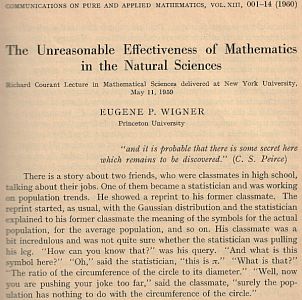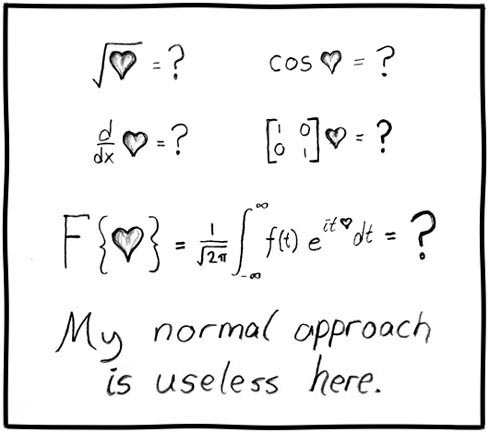In
Mathematics and Faith, we encountered some questions about the nature of mathematics and how doing math relates to loving God.
I cannot understate the influence a course on the philosophy of mathematics had on my thinking my last semester at Stanford. It was influential not because it answered my questions--philosophy seldom does--but because it introduced me to a new set of questions that gave me an opening to understand the relevance of faith to mathematics. Although people have been doing mathematics across diverse cultures for millennia, I learned we are without a historical consensus to what mathematics is or why it works. Many have taken the view of Hardy that “mathematical reality lies outside of us, that our function is to discover or observe it, and that the theorems which we prove, and which we describe grandiloquently as our ‘creations,’ are simply our notes of our observations.“ Certainly, we often speak of mathematical objects as it they are real objects that exist somewhere, but this view introduces the very hard questions of where does this mathematical reality exist and why is it that logical proof is our means of observing it.
A number of Christians have been attracted to this view, describing mathematical objects as the thoughts of God or objects existing in the “mind of God”. This can be seen as a theistic repackaging of Plato’s view that mathematical objects exist among the eternal, unchanging “forms” that he describes which could be accessed by properly trained reasoning. But Christians might do well to give some thoughtful consideration before altogether embracing this view, for the New Testament rejects reason as sufficient means to discern God’s thoughts.
Others, especially more recently, have argued that mathematics is less like the natural sciences and more like the arts; that is, mathematical theorems aren’t discovered, they’re invented. This allows us to understand Weierstrass’s statement that “the true mathematician is a poet.” While capturing the sense of creativity present in producing modern mathematics, the idea that mathematics is entirely a human construct faces some serious challenges which are perhaps best communicated by Eugene Wigner in his remarkable paper,
The Unreasonable Effectiveness of Mathematics. First Wigner observes,
The great mathematician fully, almost ruthlessly, exploits the domain of permissible reasoning and skirts the impermissible. That his recklessness does not lead him into a morass of contradictions is a miracle in itself: certainly it is hard to believe that our reasoning power was brought, by Darwin's process of natural selection, to the perfection which it seems to possess.
In creative endeavors, especially those undertaken by a large number of people, it is important to have a clear map of where one is going. We produce blueprints and models before building skyscrapers. But it appears the case in mathematics has been a reckless addition of rooms and floors which, rather than produce incoherence, has consistently resulted in what the community describes as surprisingly elegant and beautiful.

Wigner went on to make the case that not only is mathematics surprisingly internally coherent, but it is unreasonably good at explaining the natural world. He noted that although mathematics may have been quite grounded in physical problems centuries ago when there was little distinction between a mathematician and a physicist, beginning in the 19th century mathematics became an abstract discipline and notably detached from the world the mathematicians inhibited. Non-euclidean geometries were developed, despite their counter-intuitive feel, and abstract algebraic structures were studied that seemed to have lost any attachment to phenomena in this world. Yet, Wigner observed, these became precisely the mathematical foundations that were necessary to fuel the physical discoveries of the 20th century. Wigner concluded, “The miracle of the appropriateness of the language of mathematics for the formulation of the laws of physics is a wonderful gift which we neither understand nor deserve.”
A number of individuals have offered fascinating responses to Wigner, but even these responses tend to recognize that they come short of fully satisfying the questions Wigner raised. The mystery is threefold: why are we capable of doing mathematics, why is there a deep structure to the universe, and why does our mathematics explain this structure so well? Here, as we'll see in the next post, the Christian worldview is particularly well-suited to provide a compelling framework to make sense of these miracles.



